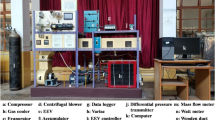Abstract
Many papers have already done performance study in different types of AC systems on R32 and got a series of conclusions. But research papers on the discharge temperature are scarce. Discharge temperature is one of the important indicators of system security. High discharge temperature will cause the compressor lubricant carbonation, wire protection layer aging and has a severe impact on system security after long running. This paper first does comparison of discharge temperature difference between R32 and R410a in commonly used evaporation and condensation temperature range, then predicts the discharge temperature of air conditioning system with R32 through simulation with lumped models. The results show that the discharge temperature of R32 is higher than R410a’s and the lower–upper limit value range is about 0 ~ 35.4 °C under the same evaporation and condensation temperature. It is found that the model predictions for the discharge temperature showed about deviations of ±10 % compared with actual test data.
Access this chapter
Tax calculation will be finalised at checkout
Purchases are for personal use only
Similar content being viewed by others
References
Qin Y, Zhang J (2012) Study on the method of reducing discharge temperature of refrigerant system with R32. J Refrig 33(1):14–17
Wang C, Zhu X, Gong Y (2011) Experiment research on R32 substituting for R410a in household air conditioning. Fluid Mach 39(7):65–67
Mei K, Li M, Liang L (2011) Comparative research on the cycle performance of R32 & R410a. Refrig Air Conditioning 11(2):56–59
Shi M, Jia L, Zhong Y et al (2011) Performance test onR32 unitary air conditioner. Refrig Air Conditioning 11(2):78–80
Zhou Y, Liu Z (2011) Application experimental study of R32 refrigeration compressor. Refrig Air Conditioning 11(2):53–55
Xiong J, Tang D, Zhou H (2011) Experimental study on air cooled water chiller & heater unit using R32 instead of R410a. Refrigeration Air Conditioning Electr Power Mach 32(3):13–15
Shi L, Zhu M (2010) Re-analysis on using R32 to substitute for R22 in household/commercial air-conditioning. J Refrig 31(1):1–5
Lin C (2011) Performance of R32 and its applicable studies on air conditioner. Refrigeration 30(3):1–5
Han X, Xu Y, Qin Y et al (2010) Experimental study on the cycle performance of refrigerant R32. Refrig Air Conditioning 10(2):68–70
Zhang L, Liu Y (2010) Theory analysis about application of refrigerant R32 on air-conditiong. Refrig Air Conditioning 10(3):76–78
Waltrich M, Hermes CJL, Melo C (2011) Simulation-based design and optimization of refrigeration cassettes. Appl Energy 88:4756–4765
Lemmon EW, McLinden MO, Huber ML (2002) NIST reference fluids thermodynamic and transport properties – REFPROP 7.0. standard reference database 23. Gaithersburg, NIST
Zhu M, Shi L (2009) Exploration of using R32 to substitute for R22 in household/commercial air conditioning. Refrig Air Conditioning 9(6):31–34
Anand S, GGupta A, Tyagi SK (2013) Simulation studies of refrigeration cycles: a review. Renew Sustain Energy Rev 17:260–277
Ding G (2007) Recent developments in simulation techniques for vapor-compression refrigeration systems. Int J Refrig 30:1119–1133
Han H, Xiao R, He S et al (2008) Dynamics simulation of the air-conditioning system with inverted based on the moving-boundary model. Fluid Mach 36(6):71–75, 85
Wang W, Zhao J (2005) Dynamic simulation of condenser. J Eng Thermophys 26(4):631–634
Zhou Y, Zhang X, Chen P (2002) Experimental study on heating operation of GSHP. J Dong Hua Univ 28(1):5–9, 25
Xi D, Gu B (2006) Performance fitted equations establishment of scroll compressor under variable conditions. Refrig Air Conditioning 6(4):14–18
Wang T, Chen H, Zhao W et al (2007) Steady simulation of mini-refrigerating system. Eng Sci 9(3):97–102
Cuevas C, Lebrun J (2009) Testing and modeling of a variable speed scroll compressor. Appl Therm Eng 29:469–478
Author information
Authors and Affiliations
Corresponding author
Editor information
Editors and Affiliations
Rights and permissions
Copyright information
© 2014 Springer-Verlag Berlin Heidelberg
About this paper
Cite this paper
Zhao, D., Ju, W., Chen, Z., Zhang, X. (2014). Research on the Character of Discharge Temperature of Air Conditioning System with R32. In: Li, A., Zhu, Y., Li, Y. (eds) Proceedings of the 8th International Symposium on Heating, Ventilation and Air Conditioning. Lecture Notes in Electrical Engineering, vol 262. Springer, Berlin, Heidelberg. https://doi.org/10.1007/978-3-642-39581-9_62
Download citation
DOI: https://doi.org/10.1007/978-3-642-39581-9_62
Published:
Publisher Name: Springer, Berlin, Heidelberg
Print ISBN: 978-3-642-39580-2
Online ISBN: 978-3-642-39581-9
eBook Packages: EngineeringEngineering (R0)




